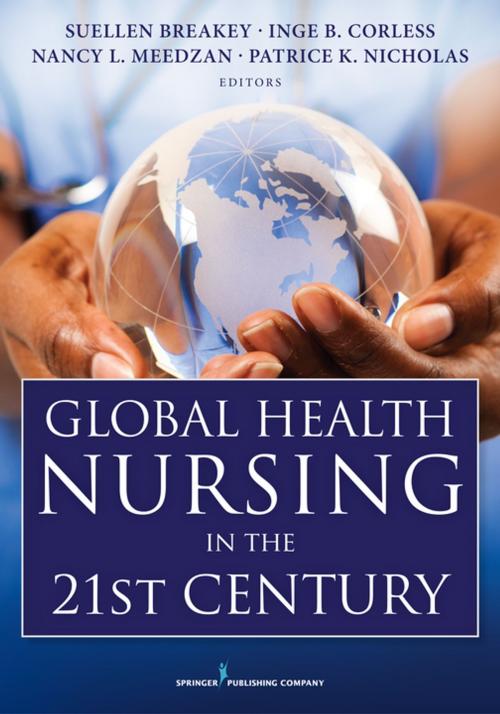| Author: | ISBN: | 9780826118721 | |
| Publisher: | Springer Publishing Company | Publication: | March 16, 2015 |
| Imprint: | Springer Publishing Company | Language: | English |
| Author: | |
| ISBN: | 9780826118721 |
| Publisher: | Springer Publishing Company |
| Publication: | March 16, 2015 |
| Imprint: | Springer Publishing Company |
| Language: | English |
THE FIRST BOOK TO PRESENT THE SUCCESSES, CHALLENGES, AND OPPORTUNITIES OF GLOBAL HEALTH NURSING
This text is designed specifically for nurses and nursing students who have an interest in global health as a specialty, regardless of experience or education level. It reflects both the unique contributions of the nursing profession and of other disciplines, which is in keeping with the editors’ perspective on how to bring about lasting change. The text views global health through a nursing lens, but maintains this awareness and appreciation of interprofessionalism throughout.
The editors and contributors have firsthand experience of the complex dynamics in achieving global health, and bring a wealth of knowledge to this important field, which has grown as a course and specialty. The text depicts the worldwide expansion of nursing partnerships between resource-rich and resource-limited countries, discusses challenges and obstacles, and provides cases and guidance on how to achieve global health. It will appeal to all nurses, from student nurses embarking on a global health experience to more experienced global health nurses who offer professional nursing expertise from around the world.
The text responds to a recent WHO mandate, which seeks the input of nurses and midwives as part of an interprofessional team of key strategists for facilitating global health. The Lancet report is also an important document used throughout the text, and an interview with Dr. Julio Frenk, author of that report, is included. Social, political, cultural, economic, and environmental factors—including climate change—are integrated into determinants of global health. The text covers the foundations of global health, including the emerging concept of climate justice, the ethical context of global health, and the importance of interprofessional education. It addresses key issues of global health with a focus on poor and vulnerable individuals—particularly women and children—and those living in areas of conflict. In addition to describing notable accomplishments toward achieving global health, the book focuses on the need for increasing access to primary care, improving clinical practice through expanded education, and engaging interdisciplinary researchers in discovery of viable solutions. The book includes the perspectives of nurses and colleagues from other disciplines in both resource-rich and resource-limited countries. References provide resources for additional study, and PowerPoint slides and a test bank for instructors accompany the text.
KEY FEATURES
- Case studies depict real-world experiences
- Presents firsthand knowledge of global health dynamics, challenges, and opportunities
- Provides a wealth of information from multiple perspectives
- Authored by contributors across a variety of clinical and academic roles who are experienced in global health nursing and global health
- Includes chapters written by nurses from both resource-limited and resource-rich countries
THE FIRST BOOK TO PRESENT THE SUCCESSES, CHALLENGES, AND OPPORTUNITIES OF GLOBAL HEALTH NURSING
This text is designed specifically for nurses and nursing students who have an interest in global health as a specialty, regardless of experience or education level. It reflects both the unique contributions of the nursing profession and of other disciplines, which is in keeping with the editors’ perspective on how to bring about lasting change. The text views global health through a nursing lens, but maintains this awareness and appreciation of interprofessionalism throughout.
The editors and contributors have firsthand experience of the complex dynamics in achieving global health, and bring a wealth of knowledge to this important field, which has grown as a course and specialty. The text depicts the worldwide expansion of nursing partnerships between resource-rich and resource-limited countries, discusses challenges and obstacles, and provides cases and guidance on how to achieve global health. It will appeal to all nurses, from student nurses embarking on a global health experience to more experienced global health nurses who offer professional nursing expertise from around the world.
The text responds to a recent WHO mandate, which seeks the input of nurses and midwives as part of an interprofessional team of key strategists for facilitating global health. The Lancet report is also an important document used throughout the text, and an interview with Dr. Julio Frenk, author of that report, is included. Social, political, cultural, economic, and environmental factors—including climate change—are integrated into determinants of global health. The text covers the foundations of global health, including the emerging concept of climate justice, the ethical context of global health, and the importance of interprofessional education. It addresses key issues of global health with a focus on poor and vulnerable individuals—particularly women and children—and those living in areas of conflict. In addition to describing notable accomplishments toward achieving global health, the book focuses on the need for increasing access to primary care, improving clinical practice through expanded education, and engaging interdisciplinary researchers in discovery of viable solutions. The book includes the perspectives of nurses and colleagues from other disciplines in both resource-rich and resource-limited countries. References provide resources for additional study, and PowerPoint slides and a test bank for instructors accompany the text.
KEY FEATURES
- Case studies depict real-world experiences
- Presents firsthand knowledge of global health dynamics, challenges, and opportunities
- Provides a wealth of information from multiple perspectives
- Authored by contributors across a variety of clinical and academic roles who are experienced in global health nursing and global health
- Includes chapters written by nurses from both resource-limited and resource-rich countries















